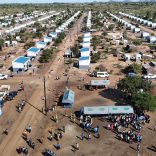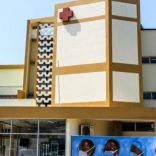U.S. commits $160 million in HIV, and TB support for Mozambique
Mozambique: Over half Cabo Delgado girls aged 15-19 have been pregnant – study

FILE - For illustration purposes only. [File photo: Lusa]
More than half of girls between the ages of 15 and 19 in Mozambique’s Cabo Delgado province have already been pregnant, according to a study by the National Statistics Institute (INE), with the Directorate of Education acknowledging that this has consequences for their education.
“It’s quite worrying,” the provincial director of Education in Cabo Delgado, Ivaldo Quincardete, told Lusa. “This is another indication of the enormous challenge facing the province. Unfortunately it doesn’t have good indicators.”
The average number of children per woman in Mozambique has fallen to 4.9, the lowest in 25 years, according to the Demographic and Health Survey (IDS), presented on 24 August by INE. It also shows that 36% of adolescents aged between 15 and 19 have already been pregnant and 7.5% are currently pregnant, compared to 29.3% and 8.2% in the IDS carried out in 2011, respectively. However, 55.3% of adolescents in Cabo Delgado province aged between 15 and 19 have already been pregnant, the highest figure in the country.
READ: Mozambique: PGR opened 250 cases of abuse of minors in Manica
“What is happening – something curious – is that unfortunately we have some schools where the girls become pregnant – because we now allow pregnant girls to study, they continue to study normally – they are studying, but the children are outside the school grounds with a minor, with a nanny, looking after the baby, seven or eight years old, and sometimes we realise that they are not studying,” acknowledged Quincardete. “So we’ve solved one problem, but now we’ve created another.
“We also have to work to sensitise these mothers, so that in the opposite period, if she studies in the afternoon, then she leaves that girl, the nanny, to look after her daughter, to study in the morning, or vice versa,” he added.
In a province that for the last six years has been living with the consequences of attacks by rebelt groups that have claimed around 4,000 lives and displace more than one million people, as well as destroying almost 200 schools, the high rate of illiteracy is another of the concerns in sector.
“It’s very high,” said Quincardete. “Unfortunately – I’m very sad to say this – we have a high number of people who can’t read or write, especially women. Almost seventy percent of women can’t read and write, and that’s our challenge. We’ve been working hard to reduce this rate, but due to this situation, the movement of the population, sometimes it’s not easy to really concentrate on being able to make our fellow citizens literate.”
READ: Mozambique: Four in ten girls get ‘married’ before the age of 18 – official
Currently, Cabo Delgado province has around 824 schools of which around 190 are still closed.
Last year it had 596,000 pupils, from first to 12th grade, and in the current 2023 school year it has 671,000 pupils, with a total of 730,000 pupils expected in 2024.
According to Quincardete, “the needs are very great” in Cabo Delgado, which “outside of the situation it is experiencing, unfortunately due to terrorism, was already a province with a deficit in the number of classrooms.”
In the survey, which was carried out in 2020, a need was identified for 2,222 more classrooms throughout the province “to remove the children who study outdoors under the trees” and “around 37,000 double desks to really remove the children sitting on the floor.”
In 2021, Cabo Delgado had around 96,000 displaced pupils – a figure that fell in 2023 to 40,000.












Leave a Reply
Be the First to Comment!
You must be logged in to post a comment.
You must be logged in to post a comment.